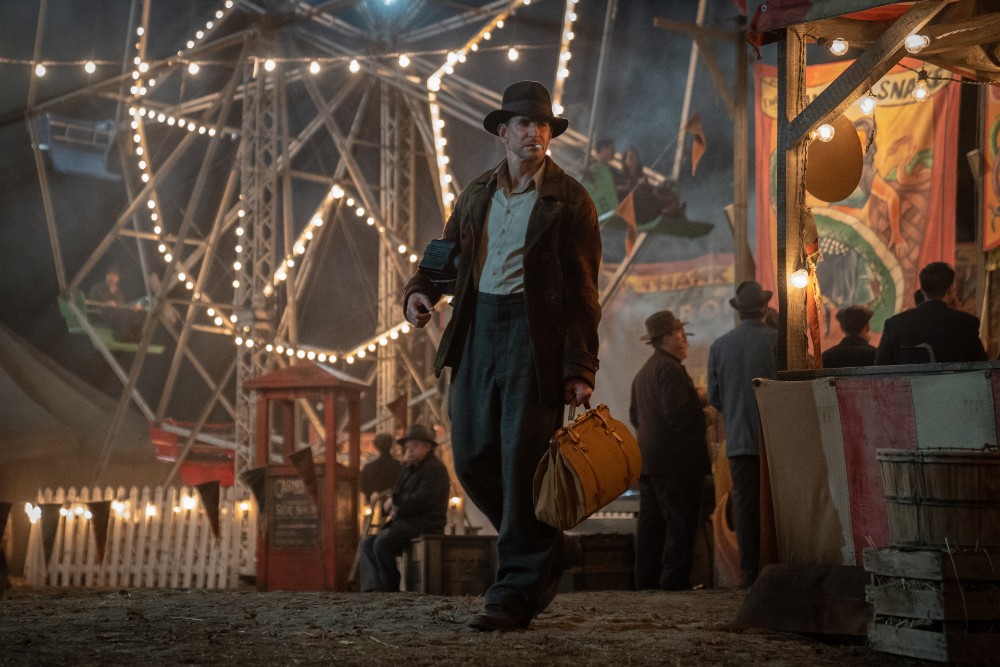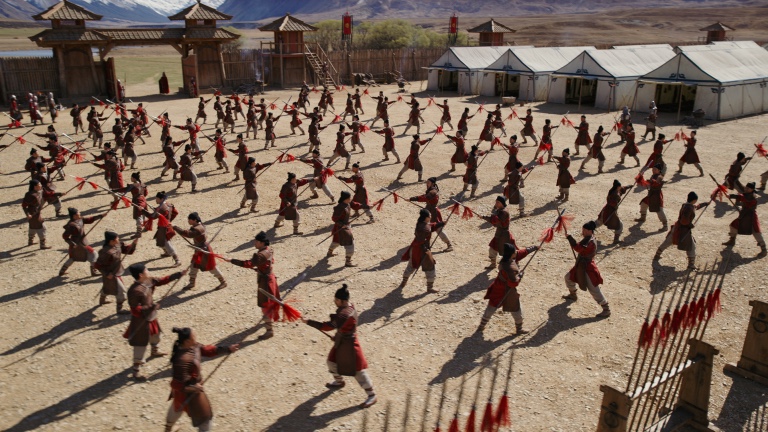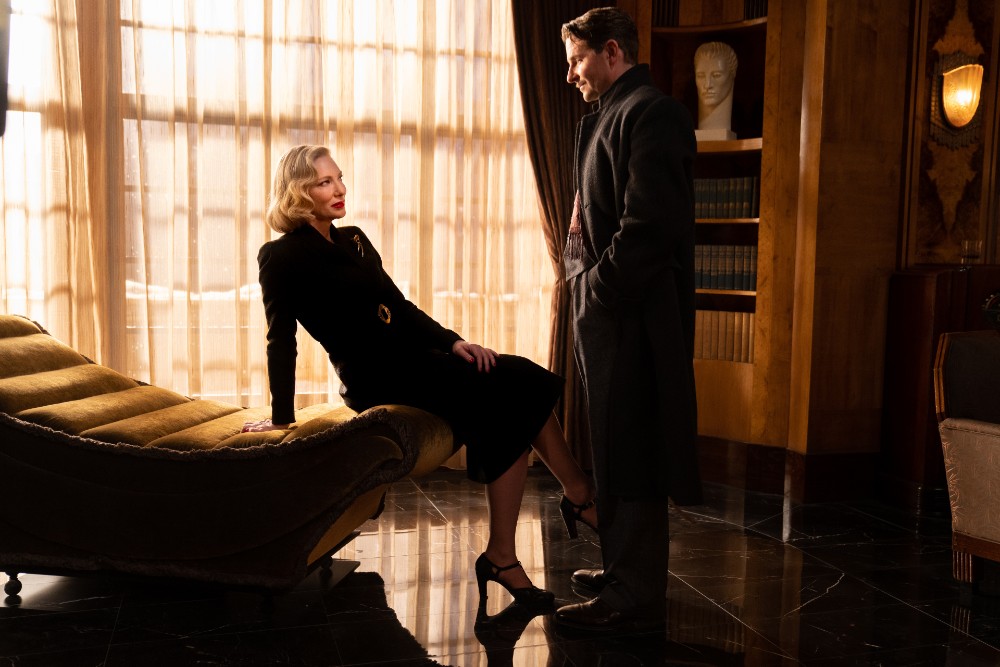
For sixteen years, Nathan Johnson has helped mold the sound of cousin Rian Johnson’s film work, scoring four of his five feature films, but he’s also been scoring other projects, including Guillermo del Toro’s upcoming movie, Nightmare Alley.
Nightmare Alley, adapted from a 1946 novel by William Lindsay Gresham, follows Bradley Cooper’s Stanton Carlisle, a wanderer who ends up at a carnival run by Clem (Willem Dafoe), whose star attraction is the half-man, half-beast geek, but that act comes with a dark secret. Stan ends up working together with the clairvoyant act of “Madame Zeena” (Toni Collette) and her alcoholic husband Pete, as well as the attractive younger Molly (Rooney Mara). After learning all he can from Zeena, Stan goes off on his own, taking Molly with him, to start his own traveling clairvoyance act, but one night he encounters Cate Blanchett’s psychologist, Dr. Lilith Ritter, who wants Stan to use his “powers” to make money off a rich mark.
Nightmare Alley allows Johnson to play in new genre territory than with his previous genre films with Rian, the most recent one being the mystery-comedy pastiche, Knives Out, has a similarly impressive ensemble cast as Johnson’s first collaboration with del Toro. Johnson’s score is one of the many aspects of the film that makes it a below-the-line marvel, showcasing some brilliant craftsmenship.
Below the Line spoke with Johnson on the day after Nightmare Alley’s New York City premiere, where Searchlight Studios was holding a junket that included many of the key craftspeople from the film. Besides talking about his collaboration with del Toro, we got a little tease for his next collaboration with his cousin for next year’s Knives Out 2.

Below the Line: The movie looks amazing, and your score just does so much to set the film’s mood., But first, I want to ask about your work with your cousin Rian, because I guess he’s the one who pulled you into film scoring with his first movie, Brick?
Johnson: Rian and I grew up making movies and music together since we were little kids, and so, when he was putting Brick together, he asked if I wanted to do the score for it. At that point, he was editing the movie in his bedroom. I recorded the whole score in my bedroom. It was wineglasses instead of a string orchestra and beating on filing cabinets with mallets instead of timpani drums. That was really the inception point there, and then obviously, kind of kept on going.
BTL: You guys were ahead of the pandemic filmmaking if you were doing it in your bedrooms long before anyone else.
Johnson: I think Brick was possibly the first movie scored over iChat.
BTL: What’s interesting to me is that Guillermo hasn’t really used the same composer twice. I know he’s worked with a few of the same people on the TV shows and movies he has produced, but he really switches it up for his own movies. How and when did he approach you, and where was the movie at that time?
Johnson: The movie was basically cut together, so I came on after they had restarted up from the pandemic, and we had a really good idea of what the movie was. He sent it to me dry without music. Even without music, just the first time I watched it, it was just clear that we had something special here. I met him the next morning for breakfast, and it sort of felt like we locked in immediately and almost like we had a history. That first breakfast meeting just felt like, “Okay, we’re on the same page, we’re vibing, we’re trying to accomplish the same thing here.” And we just dove right in.
BTL: I can’t imagine anyone not getting along with Guillermo. I feel he’s one of those rare people who can meet anyone and you immediately like him. He’s amazing like that.
Johnson: He’s such a lovely person and clearly such an artist. It’s kind of the ideal person to work with.
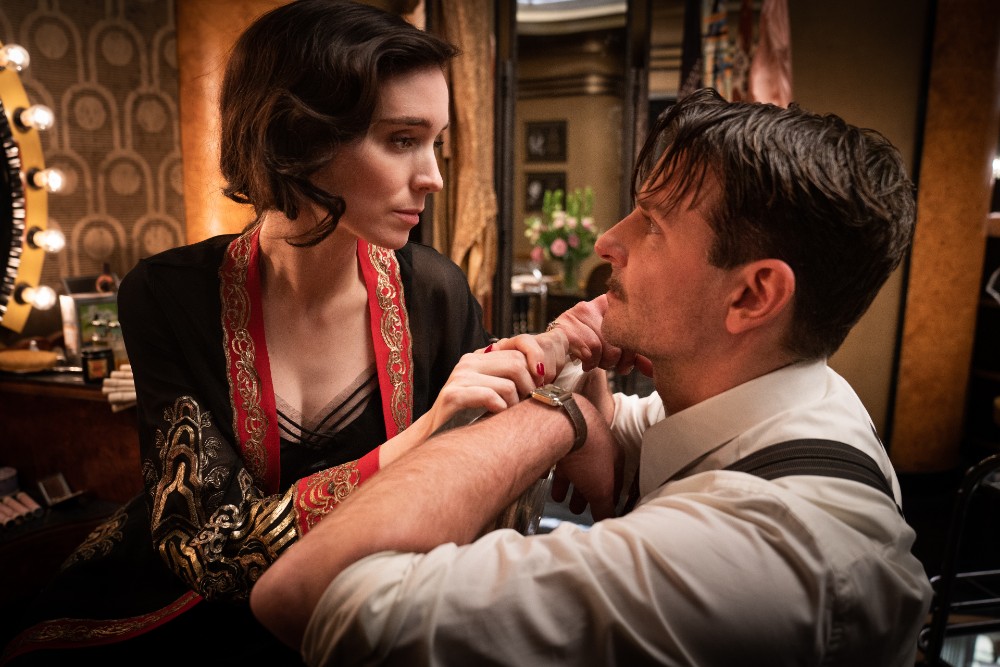
BTL: I also can’t imagine watching this movie without music. I’ve spoken with a lot of composers about temp music, and how most of them hate it, even when it’s temp’ed with their own music. There’s a lot of reference for this time period and for film noir in general. When you first watched it, did you immediately have ideas of what needed to be added and done?
Johnson: Well, it’s funny. The first time I ever watch a movie, I’m not thinking about music, right? I’m watching the movie as a fan, and I’m thinking, “Do I like this movie? Am I excited about this movie? What’s the movie saying?” I really always sort of come to the first viewing just as a film fan. I know there will be plenty of time to think about music, but I don’t want to shortcut that process of me just being open and hearing what the movie is saying to me. But, it was interesting for this one because about five minutes after I finished watching it, I started thinking about Bradley Cooper’s character and his arc through the movie, and what’s going on, and that for me was sort of… about five minutes afterwards, I called the studio and I talked to the head of music and I was like, “I think I know what this movie wants for a score. I think I know how to score it.” That was kind of my first discussion with Guillermo, just a bit about the music, but really, what is this movie talking about? What’s this movie saying?
BTL: Being a noir film, there’s so much reference you can have and stuff you can watch, so do you watch some of these other noir films? Do you try to avoid them or mix it up?
Johnson: Avoid, for sure. I mean, it’s not like I’m purposely trying to avoid, but the way that Guillermo and I talked about this is… those are helpful terms when you’re talking about the movie after it’s done. But we just wanted to let this movie speak to us. That was such a nice thing for me to say, as I’m approaching it, I’m not thinking about genres or musical styles. I’m just thinking about who are the characters? What are they doing? And how are they interacting with each other? For this movie, it was all character-based for the score. There’s four main themes. They’re all motivated by the characters, and they keep repeating, they keep popping their heads up throughout the movie and interacting with each other in different ways. So for me, that was really my doorway into it. And obviously, now that it’s done, I’m able to look at maybe how that fits into noir and how maybe in some cases, it breaks out of that, but it’s really fun to be able to just let the movie speak to me, as I’m creating, and then just to respond to what the characters are doing.
BTL: I feel it’s definitely an old school thing to have themes for the different characters — I feel like Bernard Hermann would work that way. Did you do a similar thing for Knives Out or was that different since you’re more involved as Rian is making his movies?
Johnson: Knives Out, I actually started writing early. Actually, I was on set for Knives Out, writing and sketching while we were shooting for that. So yeah, quite a different experience on that, but I really loved kind of coming in on this one when the movie was basically done. That’s another thing is I always love to read the script before I watch the movie, and with this, the first exposure was not to the book, was not to the script, it was just watching the finished movie. That was a new thing for me. That was a really fun way to approach it.
BTL: Do you have to just sit at your computer watching it? It’s such a beautiful movie, it’s hard to imagine watching it that way.
Johnson: I streamed it to my TV. I watched in my living room. It felt like a good cinema experience, even at a rough cut.
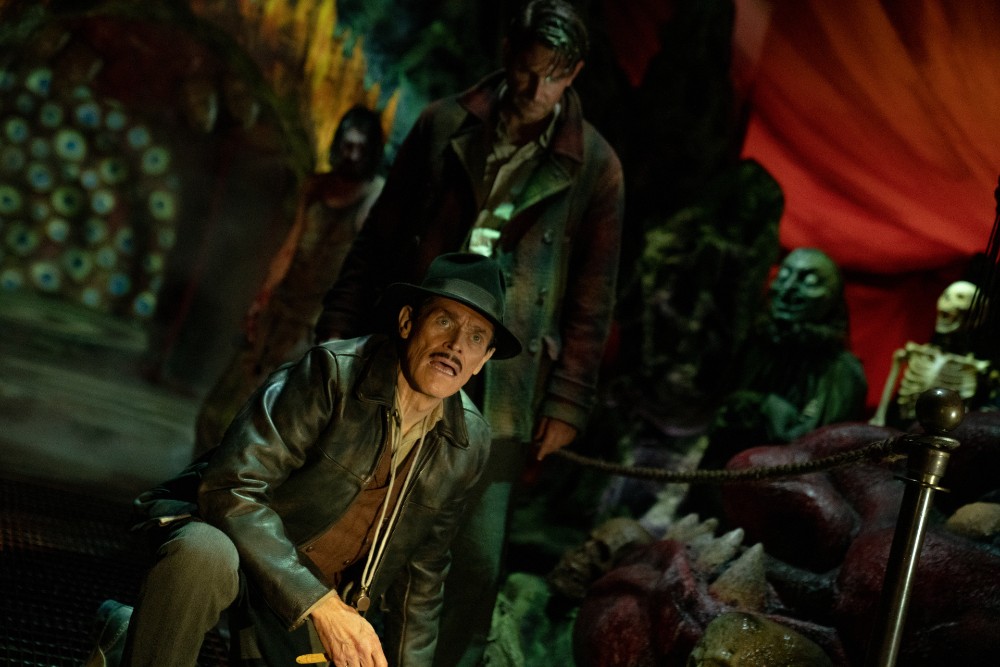
BTL: I’m not sure what your main axe was when you were playing in bands, but do you usually sit at a piano to first start writing? Is that your customary practice?
Johnson: I kind of jump around. I like to change it up, because that sort of forces you… I mean, I feel like the instrument you choose to use will dictate where you write. I remember for this movie, I mean, it was a quick process. I was with my wife at a grocery store. I was standing outside a Whole Foods, just singing into my phone, and that eventually became one of the key themes. I guess it changes a little bit but iPhone and voice were weirdly one of the ways I wrote on this movie.
BTL: My songwriting chops are not great, but I know that on this digital recorder, I have a folder of little melodies I’ll sing into it when I wake up at 3 in the morning that I’m afraid to listen back to.
Johnson: My phone’s Sketchpad. I would be horrified if I lost it. I’ve got hundreds and hundreds of snippets of ideas.
BTL: What was your main axe, though? Did you start on keyboards or guitar?
Johnson: I started on bass, and then guitar, and then I use piano to write, but thankfully, I get to bring in players, who are much more competent than I am to realize what I’ve written.
BTL: What’s your relationship with computers and MIDI and stuff like that? Obviously, if you’re doing home recording, that’s key, as is working during a pandemic, it’s also key.
Johnson: I grew up from the band world, right? My main DAW (digital audio workstation) is ProTools. All I knew when I was starting was how to actually record, so Brick was just all recording in my apartment, and then slowly sort of got used to working with samples. Obviously, when we’re doing big orchestral scores like this, it doesn’t make sense to record it before you’ve written it. The approach now is writing with an orchestral template, and then we got to go to London and just work with the amazing players there to fully realize it.
BTL: Were you able to be there in the studio with Guillermo and everyone? Was everything starting to open up by the point you were recording the score?
Johnson: We just recorded the score a month and a half ago, and we were one of the first movies to actually come over and do it live in the room. There was a lot of Zoom recording over the last two years, but yeah, it was such a nice… I mean, I was dying to get back over there, and I’m so glad we got to be there in person. And with this score, it was really helpful to be in person, just because there was so much dialing in. It’s a subtle score, but there’s so much precision that we got to dial in by being in the room.
BTL: I’ve heard so many amazing stories of composers being in L.A., the conductor in England and the orchestra in Vienna – I’ve heard lots of configurations. Because you’re used to doing stuff yourself, was it easier to continue writing during the pandemic with that background?
Johnson: That’s often [what] a composer’s life looks, showing up by yourself and sitting at a piano and writing by yourself all day. So weirdly, the pandemic doesn’t feel that different from my normal rhythm of just being in front of a computer writing. But, the thing that you can never capture with that is what it’s like to be with live musicians in the room. I’m so glad to be able to be doing that again.
BTL: Nightmare Alley almost feels like a movie in two halves. You have the first half at the carnival, which requires specific music, things like calliope music, and then the second half goes for full-on noir thriller — big orchestral strings, etc. Did you want to focus on one half over the other when you started writing?
Johnson: We talked about that early on, and Guillermo, in his mind, I think the music was very small to begin with. We start the whole movie from a single repeating piano note, and then, as Bradley Cooper’s character sort of puts on these different masks, he keeps reinventing himself. The idea is to just bring in all of this lush, orchestral, all these arrangements to kind of bump against that repeating motif and really swell and support that. But then, the thing that I felt was so compelling about this movie is what it says in that main character’s arc. Eventually, we’re able to strip everything away, and the movie ends with a score in the very same place that it begins with that single repeating piano motif.
BTL: We have Stan’s journey we follow, and then things change when Cate Blanchett’s character shows up. Did Rooney’s Molly have her own musical theme that came in and out as well?
Johnson: Exactly, yeah, and Guillermo was like, “Don’t give me a love theme for this. I don’t want a love theme.” Rooney’s character, Molly, Guillermo talks about her sort of as the moral center of the movie. Her theme is just sort of this guileless soft piece that I made sure not to give Guillermo a love theme. But, I think there’s an innocence in her that was really nice to capture, because she plays that through the movie.
BTL: She seems like the only nice person in the movie. Even though there are those men at the carnival (including one played by Ron Perlman) who are protective of her, they also seem to have ulterior motives. I assume you’ve already started scoring Rian’s Knives Out 2? We obviously don’t know much about it other than Rian having this crazy cast he put together. How has it been different scoring that over the first one? Were you still able to go to set when he was shooting in Greece?
Johnson: Same thing. That was sort of my first trip that I took after the pandemic sort of eased travel restrictions. I was on set for basically the entire time, writing and just kind of working on that, and actually, that was when I got the call from Guillermo. I had just gotten back. We had just basically wrapped production on Knives Out, on the new one, and so, I talked to Rian and let him know, “Hey, I know you’re gonna go into the editing room. I think we can I think we can do this and turn it around before you’re ready to jump in.” And Rian was like, “Yeah, you gotta go do this. Like, go for it.” So yeah, and now I’m diving back into working on the Knives Out sequel again, so here we go.
Nightmare Alley opens nationwide on Friday, Dec. 17. Look for more craft interviews from Guillermo del Toro’s noir thriller in the coming weeks. All photos courtesy Searchlight Pictures.

